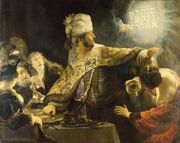
"Mene, Mene, Tekel Upharsin" is a Biblical expression that originates from the Book of Daniel, from the handwriting on the wall that was witnessed at a banquet hosted by King Belshazzar of Babylon. As those at the feast profaned the sacred vessels pillaged from the Temple in Jerusalem, a disembodied hand appeared and wrote on the palace wall the words, "Mene, Mene, Tekel, Upharsin". The prophet Daniel was summoned and interpreted this message as the imminent end for the Babylonian kingdom. That night, Belshazzar was killed and the Persians sacked the capital city.
During the drunken feast that witnessed the incident, Belshazzar uses the holy golden and silver vessels, from the Temple, to praise "the gods of gold and silver, brass, iron, wood, and stone". Soon afterwards, disembodied fingers appear and write on the wall of the royal palace the words: "מנא, מנא, תקל, ופרסין :Mene, Mene, Tekel, Upharsin"
The advisers attempt to interpret the meaning. However, their natural denotations of weights and measures were superficially meaningless: "two minas, a shekel and two parts". Therefore, the King sends for Daniel, a Jewish exile taken from Jerusalem, who had served in high office under King Nebuchadnezzar II of Babylon. Rejecting offers of reward, Daniel warns the king of the folly of his arrogant blasphemy before reading the text. The meaning that Daniel deciphers from these words is based on passive verbs corresponding to the measure names, "numbered, weighed, divided." Other popular translations include, "You have been weighed, measured, and found wanting."
Mene, Mene, Tekel, Upharsin in Alpha and Omega[]
Iran launched three missiles at Israel in retaliation for the removal of the Dome of the Rock from the Temple Mount. While the missiles were en route, they simply disappeared. At the same time, the President of Iran, the Minister of Defense and the incumbent Grand Ayatollah all dropped dead without a mark. On the President's office wall was written Mene, mene, tekel upharsin in ancient Aramaic script, unused in 2,000 years.[1]
See also Inconsistencies (Alpha and Omega)
Mene, Mene, Tekel, Upharsin in The Opening of The World[]
In the Golden Shrine, Count Hamnet Thyssen was told by a priestess that he should tell a particular phrase to the Raumsdalian Emperor, Sigvat II, after he wondered what his sovereign's reaction would be to the finding of the Shrine.
After getting to the imperial palace in Nidaros, Thyssen recounted the words, in the original language, to the Emperor and his retinue. As he said the words, before all of them, a scene of a tyrannous king getting weighed on the scales and getting found wanting, appeared.
The tableau was interpreted by everybody that Sigvat didn't deserve the throne. He promptly fled before any of his subjects revolted, as Trasamund warned him to.
See also[]
- Book of Daniel, for additional references to the same passage.
References[]
- ↑ Alpha and Omega, pgs. 222-223, hc.
| ||||||||||||||||
| ||||||||||||||||||||||



